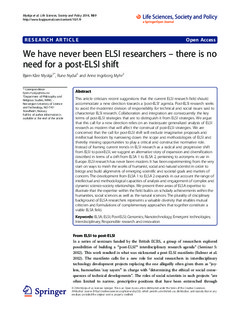| dc.contributor.author | Myskja, Bjørn Kåre | |
| dc.contributor.author | Nydal, Rune | |
| dc.contributor.author | Myhr, Anne Ingeborg | |
| dc.date.accessioned | 2019-11-04T07:43:41Z | |
| dc.date.available | 2019-11-04T07:43:41Z | |
| dc.date.created | 2014-04-09T09:48:17Z | |
| dc.date.issued | 2014 | |
| dc.identifier.citation | Life Sciences, Society and Policy. 2014, 10 (9), . | nb_NO |
| dc.identifier.issn | 2195-7819 | |
| dc.identifier.uri | http://hdl.handle.net/11250/2626245 | |
| dc.description.abstract | This article criticizes recent suggestions that the current ELSI research field should accommodate a new direction towards a ‘post-ELSI’ agenda. Post-ELSI research seeks to avoid the modernist division of responsibility for technical and social issues said to characterize ELSI research. Collaboration and integration are consequently the key terms of post-ELSI strategies that are to distinguish it from ELSI strategies. We argue that this call for a new direction relies on an inadequate generalized analysis of ELSI research as modern that will affect the construal of post-ELSI strategies. We are concerned that the call for post-ELSI shift will exclude imaginative proposals and intellectual freedom by narrowing down the scope and methodologies of ELSI and thereby missing opportunities to play a critical and constructive normative role. Instead of framing current trends in ELSI research as a radical and progressive shift from ELSI to post-ELSI, we suggest an alternative story of expansion and diversification described in terms of a drift from ELSA 1 to ELSA 2, pertaining to acronyms in use in Europe. ELSI research has never been modern. It has been experimenting from the very start on ways to mesh the works of humanist, social and natural scientist in order to bridge and build alignments of emerging scientific and societal goals and matters of concern. The development from ELSA 1 to ELSA 2 expands in our account the range of intellectual and methodological capacities of analysis and engagement of complex and dynamic science-society relationships. We present three areas of ELSA expertise to illustrate that the expertise within the field builds on scholarly achievements within the humanities, social sciences as well as the natural sciences. The plurality of disciplinary background of ELSA researchers represents a valuable diversity that enables mutual criticism and formulations of complementary approaches that together constitute a viable ELSA field. | nb_NO |
| dc.language.iso | eng | nb_NO |
| dc.publisher | BioMed Central | nb_NO |
| dc.rights | Navngivelse 4.0 Internasjonal | * |
| dc.rights.uri | http://creativecommons.org/licenses/by/4.0/deed.no | * |
| dc.title | We have never been ELSI researchers – there is no need for a post-ELSI shift | nb_NO |
| dc.type | Journal article | nb_NO |
| dc.type | Peer reviewed | nb_NO |
| dc.description.version | publishedVersion | nb_NO |
| dc.source.pagenumber | 17 | nb_NO |
| dc.source.volume | 10 | nb_NO |
| dc.source.journal | Life Sciences, Society and Policy | nb_NO |
| dc.source.issue | 9 | nb_NO |
| dc.identifier.doi | 10.1186/s40504-014-0009-4 | |
| dc.identifier.cristin | 1127902 | |
| dc.description.localcode | Open Access This article is distributed under the terms of the Creative Commons Attribution 4.0 International License (https://creativecommons.org/licenses/by/4.0), which permits use, duplication, adaptation, distribution, and reproduction in any medium or format, as long as you give appropriate credit to the original author(s) and the source, provide a link to the Creative Commons license, and indicate if changes were made. | nb_NO |
| cristin.unitcode | 194,62,70,0 | |
| cristin.unitname | Institutt for filosofi og religionsvitenskap | |
| cristin.ispublished | true | |
| cristin.fulltext | original | |
| cristin.qualitycode | 1 | |

